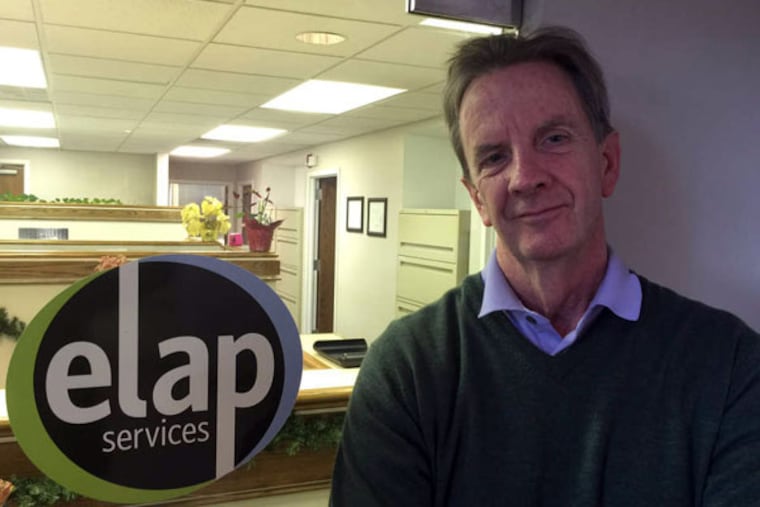Chesco firm helps employers keep a lid on health costs
Chief financial officers typically have a solid grasp of costs and how to cut them. It's their job. "Yet when it comes to health care, they leave that at the door," said Stephen P. Kelly, president of ELAP Services, a Chester Springs company with a painstaking approach to cutting hospital bills for self-insured employers.

Chief financial officers typically have a solid grasp of costs and how to cut them. It's their job.
"Yet when it comes to health care, they leave that at the door," said Stephen P. Kelly, president of ELAP Services, a Chester Springs company with a painstaking approach to cutting hospital bills for self-insured employers.
Instead of paying premiums to an insurance company, which then pays medical bills, self-insured employers set aside money to pay the bills themselves through a third-party administrator.
ELAP - a player in a broad private effort nationwide to improve price-transparency in health care - takes on the cost analysis for its clients by combing through hospitals' actual department-by-department costs they reported to Medicare.
For major back surgery, for example, ELAP employees, called "repricers," go through every line of what could be a 30-page hospital bill and adjust the charges based on the hospital's actual costs, using Medicare cost data.
Then ELAP adds back a predetermined percentage of the cost, typically 12 percent to 25 percent, "to allow a fair margin above that cost," Kelly said.
In a case that landed in court, a hospital billed $312,655. ELAP said its client should pay only $99,476, or 32 percent of gross charges, based on Medicare cost data. That determination stood up to a federal judge's scrutiny in a 2013 court case.
ELAP stands for ERISA Liability Assurance Program, incorporating the acronym of the federal law designed to protect employee retirement and health-care benefits.
Among the beneficiaries of ELAP's financial forensics is the city of Marion, Ind., with 265 employees and 750 people covered by its health insurance.
Mayor Wayne Sebold said ELAP helped the city of 29,500, about halfway between Indianapolis and Fort Wayne, save $2.7 million, or about 50 percent, on the cost of health care.
That saving was a significant factor in a bond upgrade, to A- from BBB-, that Marion received from Standard & Poor's about a year ago.
"What appealed to me is that it gave us a base, Medicare being the base," said Sebold.
ELAP started in 2007 offering the auditing services Sebold's city uses. It now has more than 200 clients, with a concentration in Texas, as well as Indiana, Georgia, California, and New Jersey.
The number of employees of ELAP clients ranges from 100 to 3,000, but the sweet spot is 400 to 500, Kelly said.
ELAP, which is privately held, employs 60. Kelly declined to disclose annual revenue. The company charges clients a percentage of the cost of care or a flat fee per employee.
Kelly, 60, founded ELAP as an antidote to what he saw as a lack of transparency in medical billing for employers trapped in relationships with third-party administrators who have proprietary contracts with hospital networks.
"Employers pay for access to a network, but they get very little insight into the prices," Kelly said.
Kelly's previous business, the Aldwyn Group, also worked with self-insured companies. Aldwyn, which Kelly sold in 2002, provided a type of insurance called reinsurance that would kick in after the employer paid, say, the first $100,000 of a claim.
That's when Kelly, who lives in Villanova, started looking at medical bills.
"I began to see the arbitrary and predatory nature of billing," he said. "I would always ask for the itemized bill for any hospital stay. I would go through it line by line, and I would see that there was absolutely no connection, no correlation whatsoever, between what was on that bill and what it actually cost to deliver that service."
Kelly was looking at the infamous "gross charges" hospitals put on bills, such as $29.99 for a gauze pad that can be bought at a drugstore for $1.99.
Though no one was paying the gross charges, employers were paying through a third-party preferred provider organization, which reduced gross charges by what Kelly called a "mysterious formula."
ELAP helps employers put transparent limits on health plans. If hospitals reject them and demand more money, ELAP provides "very strong, robust advocacy for any patient who receives a balance bill or any kind of collection activity," Kelly said.
ELAP's first argument in court is that "the charge itself has no relationship to the value provided," Kelly said. ELAP typically wins summary judgments or settles for small amounts, he said.
The family-owned Bill Miller Bar-B-Q, which has 70 locations in Texas, has had no increase in claims since starting with ELAP in 2007, despite an increase in the number of people covered by the plan, controller Barbara Newman said.
"Our owners are very happy about that," Newman said.